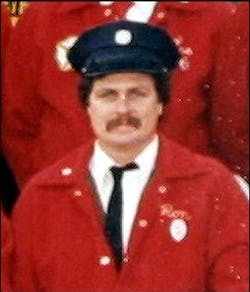GILLETTE -- Wyoming State Fire Marshal Jim Narva issued a statement Friday afternoon condemning the presence of alcohol at fire stations and all other emergency response headquarters in Wyoming.
Narva said in many communities, firehouses often serve as places for social gatherings. "That's great," Narva said in a press release. "But the alcohol aspect of social events is not OK. Alcohol and emergency services must be absolutely separated."
The fire marshal's stance came eight days after a 16-year-old Newcastle girl was killed in a fire tanker truck rollover. The driver, a veteran volunteer firefighter, was allegedly driving drunk.
Gov. Dave Freudenthal threw his support behind Narva's suggstion Friday afternoon.
"Obviously these are not state decisions but I think it is appropriate that there be state leadership with regard to an issue like that," Freudenthal said.
Inside the StoryFire Marshal:Ban Alcohol in Fire StationsWeb Link:Newcastle VFD
"Particularly in view of the events of last week, what is the rationale for having alcohol in a fire house?" Freudenthal said. "We don't have alcohol in the Capitol Building, at least none that I'm aware of."
Anndee Huber, a member of the Newcastle Volunteer Fire Department's Explorer cadet program, was a passenger in the truck. Ron Caillier, 46, of Newcastle, has been charged with aggravated homicide by vehicle. Neither Huber or Caillier were wearing seatbelts, according to the Wyoming Highway Patrol.
Caillier reportedly didn't show up for a "work night" session at the Newcastle firehouse on the night of the accident, and Newcastle Volunteer Fire Department Chief Clarence Baker said Caillier did not consume alcohol at the firehouse anytime that day. Baker told the Star-Tribune that if Caillier was drinking the day of the accident, it was not at the fire station.
However, Baker acknowledged the fire department has long maintained a bar in the upstairs portion of the firehouse stocked with keg beer.
Narva said he doesn't want to single out the Newcastle Volunteer Fire Department, which is among the most recognized for excellence in the state. But Narva said he wants to call an end to the presence of alcohol at fire stations.
"There is alcohol in fire stations," Narva said in a phone interview Friday. "That is inappropriate. I think those departments are sending a mixed message."
On one hand, fire departments say they have strict policies against responding to fire calls if a firefighter has consumed alcohol. But on the other hand, the acceptance of alcohol at the fire station creates an environment where firefighters can drink alcohol, Narva said.
"Anndee's death was a tragedy in the truest sense of the word," Narva said in the press release. "My hope is that it won't be entirely pointless, that her death may serve to bring about change. We must learn from this tragedy and rethink our positions as they pertain to alcohol."
Some in the firefighting service admit there is somewhat of a culture, or reputation, of drinking among firefighters. But that mostly comes from days long ago.
Chief Larry Curl, chairman of the Combination Officers Section of the International Fire Chiefs, said he's aware of the association between drinking and firefighters, but it is an outdated stereotype.
"In today's society, that is not the rule that is the exception," Curl said. "Even those who are an exception, we're trying to get them to change." Curl said his organization has prepared a strict policy against alcohol mixing with fire services and is actively asking departments to consider similar policies.
"We're there to save lives and protect property and that's our major goal," Curl said.
Sam Wenger has been a firefighter in various capacities for nearly 40 years and is still a volunteer for the Gillette-Campbell County Fire Department.
"About 20 years ago, when we had our meetings and yearly picnic, we were allowed to have alcohol. Now there's none at all in any of the buildings. And it was never allowed out on the fire (scene) at all." Even 20 years ago, firefighters knew that if they were drinking, they couldn't respond to a fire call, Wenger said.
"Because that would jeopardize your sense of everything," he said.
Gillette-Campbell County Fire Department Chief Gary Scott said the department's alcohol policy is still very clear: "If you've been drinking, don't show up to a fire call," he said.
The policy attempts to draw a very bold line between a firefighter's personal life off-duty and his professional life at the department. If a firefighter goes out for the evening to a drinking establishment, he is not allowed to display the fire department's name or insignia on a cap, T-shirt, jacket or anything else, he said.
"For us in our community, this is an expectation from board of directors, that we keep social events and fire department work in two separate categories," Scott said.







